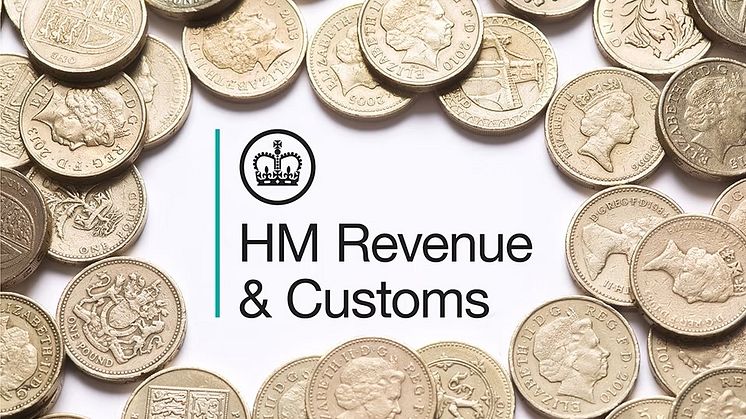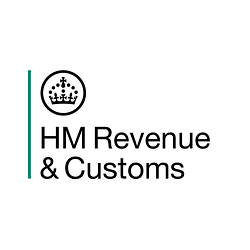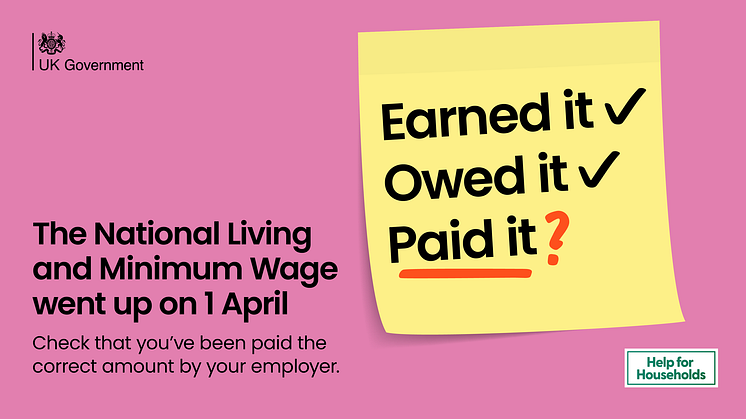
Press release -
Belfast workers urged to check their pay as 6,800 miss out on National Minimum Wage
People who work in Belfast are being encouraged to check that they are receiving the correct pay, after nearly 7,000 workers in the city were underpaid the National Minimum Wage (NMW) last year.
This month HM Revenue and Customs (HMRC) is writing to more than 30,000 workers in the area to raise awareness and warn about mistakes employers may make with their pay.
The letters give advice on how to spot the mistakes and a guide on what a worker can do if they think they have been underpaid.
The campaign follows compliance work carried out in the 2021 to 2022 financial year where HMRC discovered that 6,800 Belfast workers had been underpaid more than £406,000 due to businesses failing to comply with NMW rules.
Marc Gill, Director of Individuals and Small Business Compliance at HMRC, said:
“We want Belfast workers to get the pay they are due, which is why we are helping them to understand their National Minimum Wage entitlement and what to do if they think they have been underpaid.
“Due to HMRC’s action last year, employers in Belfast were handed penalties of more than £315,000 on top of their workers receiving the pay arrears. Businesses, irrespective of their size, are responsible for paying at least the correct minimum wage to their staff.”
The action follows HMRC outreach activity in December, including letters sent to more than 6,000 employers in Belfast to make sure they are aware of their obligations. The employers were also sent checklists to help ensure that they are compliant, and the offer of a support call with HMRC.
Four common causes of NMW underpayment are:
1.Extra time added on to the start or end of your shift that you are not paid for:
•This could be attending handover meetings, completing security checks, or performing cleaning duties at the start or end of your shift, and you are not paid for the extra time you spent working.
2.Travel time you are not paid for:
•If you have to travel in connection with your job and you are not paid for this time. This includes travelling from one work assignment to another, or travelling to training. It does not include travel between work and home.
3.Time spent training that you are not paid for:
•If you have to spend time training in connection with your job and you are not paid for this time
•This includes training that takes place at work, at home, or outside of your normal working hours.
4.Paying for items connected with your job:
•This includes things like paying for tools, equipment, uniforms, or items of clothing needed to meet a dress code.
If a worker thinks that they have been underpaid, they can report this online by visiting GOV.UK and searching ‘complain about pay and work rights’ at any time, or by calling the Labour Relations Agency on 03300 555 300. Reports can be made anonymously, or by a third party such as a family member, friend or colleague. You can also report an employer even if you no longer work for them.
Workers can access support to ensure they are receiving the correct NMW by:
•Visiting Check your pay – National Living and Minimum Wage,
•Contacting the Labour Relations Agency helpline on 03300 555 300 for further advice and support – Monday to Friday 09:00 to 17:00.
Background
1.This is part of HMRC’s regular compliance outreach activity, which sees us focus on areas of the UK by offering support and helping businesses identify risks. We have also assisted businesses and workers in Cornwall, Watford and East Anglia in this way over the last 12 months.
2.Further information about the National Minimum Wage, including who is eligible, is available on GOV.UK at:
•https://www.gov.uk/guidance/calculating-the-minimum-wage
•https://www.gov.uk/national-minimum-wage/who-gets-the-minimum-wage
•https://checkyourpay.campaign.gov.uk/
And on the Labour Relations Agency website at: https://www.lra.org.uk/.
3.Workers can access their employment information – including their income, employment history, National Insurance number and tax code – quickly and easily through the HMRC App. This information can be instantly downloaded, printed and saved to share with their employer, without the need to call us and wait for a letter.
4.HM Revenue and Customs (HMRC) is responsible for the enforcement of National Minimum Wage legislation. The Department for Business, Energy and Industrial Strategy (BEIS) is responsible for National Minimum Wage (NMW) and National Living Wage (NLW) policy.
5.The current National Minimum Wage hourly rates (from 1 April 2022) are:
•Age 23 or over (National Living Wage): £9.50
•Age 21 to 22: £9.18
•Age 18 to 20: £6.83
•Age under 18: £4.81
•Apprentice: £4.81
The NMW hourly rates change each year on 1 April, so it is important that employers check them.
The rates from 1 April 2022 were published on 27 October 2021:
https://www.gov.uk/national-minimum-wage-rates
The new NMW rates from April 2023 were announced as part of the Chancellor’s Autumn Statement, following the Low Pay Commission’s recommendations: https://www.gov.uk/government/news/large-minimum-wage-increases-help-protect-low-paid-workers-living-standards
6.By law, workers must be paid at least the minimum wage for their age for all their time spent working. If somebody thinks they may have been underpaid, they can report this online to HMRC at: https://www.gov.uk/minimum-wage-complaint
7.Employers who do not pay the NMW can be publicly ‘named’. The most recent list was published by BEIS on 8 December 2021. Those who blatantly fail to comply can face criminal prosecution, but most employers pay up when they realise mistakes have been made.
8.The Labour Relations Agency helpline is 03300 555 300.
9.Follow HMRC’s Press Office on Twitter @HMRCpressoffice
Topics
Categories
Regions
Issued by HM Revenue & Customs Press Office
HM Revenue & Customs (HMRC) is the UK’s tax authority.
HMRC is responsible for making sure that the money is available to fund the UK’s public services and for helping families and individuals with targeted financial support.






